Environmental Racism Case Appealed
Air Date: Week of October 18, 2024
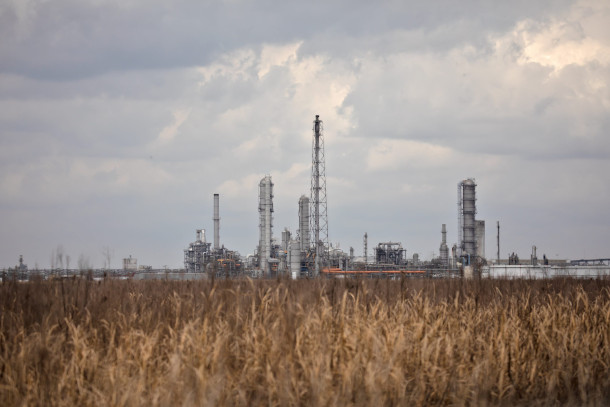
The Dow Chemical Company facility near the Mississippi River in Hahnville, Louisiana. (Photo: Goldman Environmental Prize)
In the lower Mississippi River region commonly known as Cancer Alley, communities of color live among industrial pollution while white neighborhoods have been mostly spared from heavy industry. The Fifth Circuit Court of Appeals is now considering whether to allow a landmark environmental racism lawsuit brought against the local government to go to trial. Inside Climate News reporter James Bruggers discusses the case background and context with Host Aynsley O’Neill.
Transcript
DOERING: It’s Living on Earth, I’m Jenni Doering.
O’NEILL: And I’m Aynsley O’Neill. The mix of industrial plants and residential neighborhoods along the banks of the Mississippi River between New Orleans and Baton Rouge is commonly known as Cancer Alley, and it’s a hotspot of environmental injustice. According to a 2023 study published in Environmental Challenges, toxic emissions in Louisiana are 7 to 21 times higher in communities of color compared to white communities. And chemical manufacturing is the largest contributor to this disparity. Community organizers in Cancer Alley have sued local parish governments and the petrochemical industry several times over the years. Just last year, Cancer Alley residents filed a lawsuit in Louisiana’s federal court alleging environmental racism and calling for a moratorium on new heavy industry and related infrastructure in St. James Parish. The lawsuit was dismissed but the plaintiffs appealed. And earlier this month, a three-judge panel at the mostly conservative US Court of Appeals for the Fifth Circuit held a hearing. Here to discuss is Inside Climate News reporter James Bruggers. Welcome back to Living on Earth Jim!
BRUGGERS: Thank you very much.
O'NEILL: Now you've visited St James Parish. Can you describe it for us?
BRUGGERS: Yeah. So it's a significant part of a region in Louisiana that is known as Cancer Alley, and this is former sugar cane plantations that are lined up along the banks of the Mississippi River. And all Cancer Alley is about 100 miles long, and it runs between New Orleans and Baton Rouge, or thereabouts. And there's some 200 industrial facilities like oil refineries and plastics plants, chemical plants and other factories, and their harmful air pollution endangers residents health there. When you drive through the region, you see a lot of smokestacks. You see these flare stacks where there's kind of flames atop pipes that are at industrial sites. You see a lot of pipes and a lot of tanks.
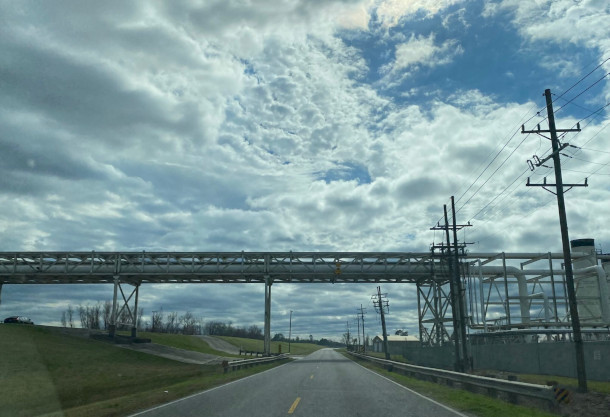
A pipeline crosses Highway 18 in St. James Parish, Louisiana. (Credit: James Bruggers)
O'NEILL: So last year, in 2023 several community groups, Inclusive Louisiana, Mount triumph Baptist Church and Rise St James, all brought forward a lawsuit against the parish government. What were the plaintiffs asking for here?
BRUGGERS: What they're asking for is for their local government to stop sending industrial facilities to the predominantly Black districts that are in St James Parish. The lawsuit is about 150, 160 pages long, and it's really interesting. It traces Black history since European settlement in the 1700s through the legacy of slavery and post Civil War racism. It asserts that the parish government or the county government intentionally direct industry towards these Black residents and away from White residents. There's five electoral districts in the parish, two of them are predominantly black, three of them are predominantly white. And in recent decades, this lawsuit claimed that as many as 20 some of these industrial facilities were permitted for the two black districts and none were permitted for in or near White districts. In fact, the lawsuit says that no new industrial facilities have been allowed to locate in the majority white parts of this parish in the last 46 years.
O'NEILL: And as I understand it, that lawsuit was rejected.
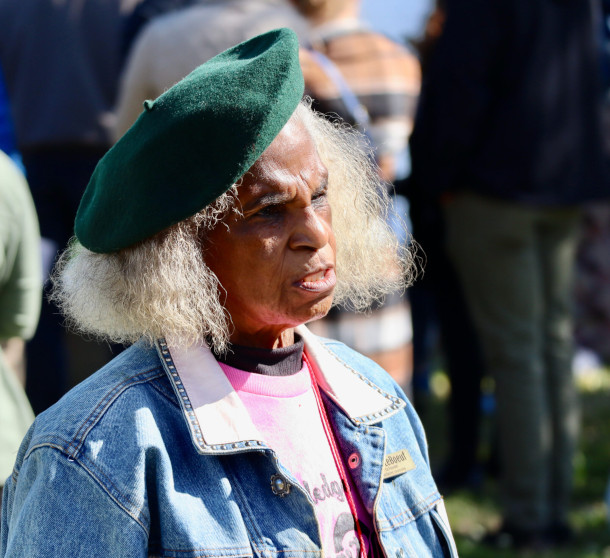
Gail LeBoeuf, a lifelong member of St. Michael Catholic Church in St. James Parish and co-founder and co-executive director of Inclusive Louisiana. (Credit: James Bruggers)
BRUGGERS: Yeah, so the trial judge, the lower court judge, determined that the several claims that were in the lawsuit that the plaintiffs didn't have legal standing, and the judge also essentially said that they had waited too long after a 2014 land use plan, which was the parish's first land use plan, had been enacted, they waited too long to sue. So it was a lack of legal standing and essentially a statute of limitations arguments that prevailed in the lower court,
O'NEILL: And now, after this lawsuit was rejected, the plaintiffs have now appealed. What are they asking for in the appeal?
BRUGGERS: Well they want the Appeals Court to overturn the lower court ruling so that they can have their day in court themselves. They want to trial, and they want to take their claims before this lower court judge and make a case so that ultimately what they're seeking is they want to stop new heavy industry from being located in their districts.
O'NEILL: And now take us to the hearing itself. What are some of the major points that came up in this recent appeals court hearing?
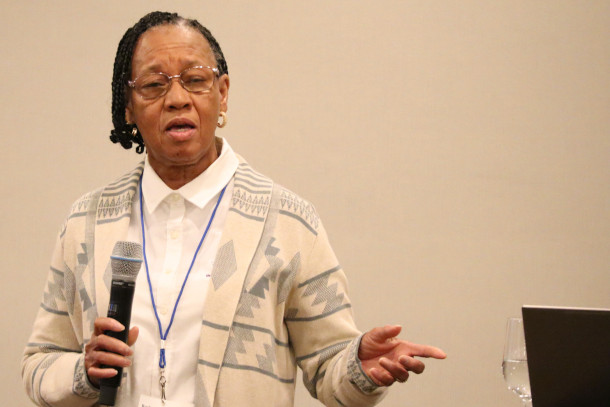
Co-founder and co-executive director of Inclusive Louisiana, Barbara Washington, speaks at a New Orleans briefing on environmental justice in 2023. (Credit: James Bruggers)
BRUGGERS: Yeah sure. So one of the issues was access to and protection of graves of slaves that are found on either existing or proposed chemical plant sites and this is an issue that was argued on religious freedom grounds. One of the judges was a little critical about this issue and pointed out to the plaintiffs that those graves were not on parish property, not on public property, so why should that be an issue in this lawsuit. And questioned also how parish officials could be responsible for them just by issuing a land use permit. And this judge had made a comparison to issuing a driver's license and then the driver goes out and gets in an accident, well, the state that issued the driver's license isn't responsible for whatever happened in that accident. So the lawyer representing the environmental justice groups countered that the two scenarios were extremely different, and that the act of issuing a permit is done knowing that there could be damage to land where the graves are located, because you're issuing a permit for activity that would occur at a specific site. So that was one of the issues. Another issue had to do with a solar farm moratorium that the parish had passed at the request of White residents. So White residents had gone to the parish government and said they didn't like these solar farms that were proposed for their neighborhoods and so the parish government passed the moratorium. When black residents asked for a moratorium on new chemical plants, the parish declined. So this was an interesting argument on the part of the parish, because the lawyer for the parish countered by saying, well, there was no official act to contest here with the industrial moratorium request because the parish council never even put it on their agenda. So there was no official act that they could contest. And then the other issue was the statue of limitations, and the attorney for the parish had argued successfully in the lower court persuading the judge to rule that the statute of limitations on suing over that 2014 land use plan had passed, you would have had to have acted within one year. So the parish in the appeals court case, or an appeals court hearing, said that should continue. But interestingly enough, there was one of the appeals court judges, Judge Haynes, who pushed back on that a little bit, saying that discrimination can occur even after an initial act, such as approving a land use permit.
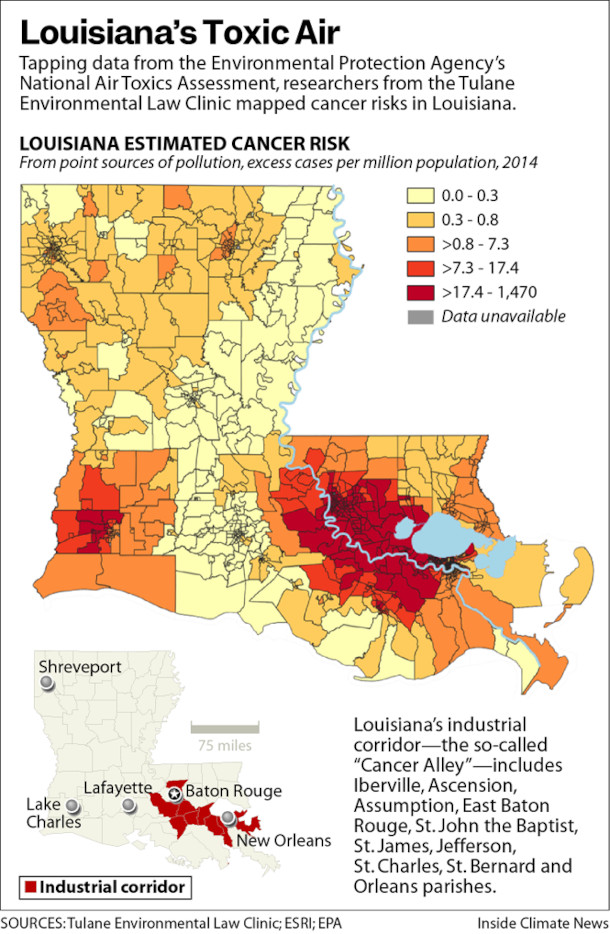
A graphic showing estimated cancer risk in Louisiana’s parishes. (Photo: Courtesy of Inside Climate News)
HAYNES: Again, I'm not saying I necessarily agree or disagree. I'm just trying to understand y'all argument that basically makes it sound like if you didn't sue within a year, well, heck, you can be discriminated against in a bunch of different ways for the rest of eternity.
BRUGGERS: Really, she kind of said hypothetically or possibly or could, she was not taking any position one way or the other, and then posed this question this way, she said, you know, if you fail to sue within a year, you can be discriminated against for the rest of the eternity, right? So that was that issue.
O'NEILL: So it sounds like this case is sort of an example of the zoning injustices that exist throughout the country.
BRUGGERS: Yeah. So this case has focused a lot of attention, particularly a lot of media attention, on long term impacts of decisions that were made decades or longer ago about certain land use practices that led to segregation, and then the resulting environmental impacts that come when you have various kinds of development or freeways or chemical plants or whatever in those areas. And I mean, this is something I see even in my own community, where I live in Louisville, Kentucky, and you can look where freeways were built, and you know, whole range of different problems. So practices such as redlining, which is like denying people access to credit because of where they live, for example, or deed restrictions on homes that effectively kept white neighborhoods white, decisions that put heavy industry into areas where poor and minority residents lived, all of these have been experienced all over the country. It's just that when you're in this chemical corridor, they seem more pronounced, and then you have the additional layer of very potent layer of slavery and the impacts of that, the legacy impacts of that on top.
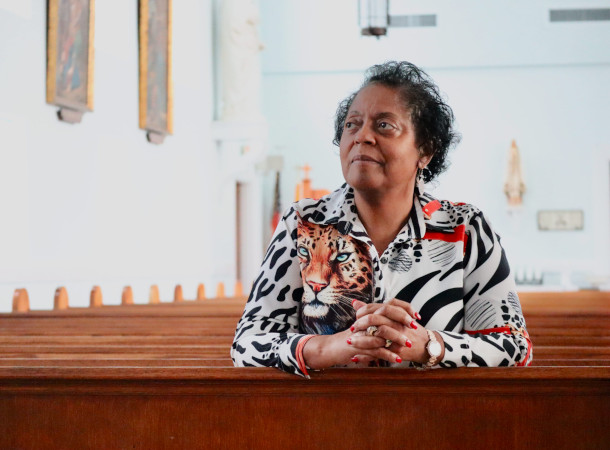
Environmental justice advocate Sharon Lavigne, founder of the group Rise St. James, inside St. James Catholic Church in St. James Parish, Louisiana. Lavigne is a lifelong member of the church. (Credit: James Bruggers)
O'NEILL: So the organization Rise St James is one of the plaintiffs in this case. And last year, you spoke to the founder, Sharon Lavigne. What did she have to say about this fight?
BRUGGERS: So I went down to St James Parish and visited her, and went with her to church. She's a woman of faith, and I talked with her about how it's faith that moved her to get involved in the environmental justice battle to begin with, and how she had felt called by God to do what she's doing, and it's her faith that keeps her engaged in the battle. Inclusive Louisiana is also a faith based group and is run by two women, Barbara Washington and Gail Leboeuf, who also have told me that it's their faith that keeps them working for environmental justice as well. And the other plaintiff in this case is Mount Triumph Baptist Church in St James, led by Reverend Harry Joseph. I visited Pastor Joseph in his church. It's a very small church, and there I found a photo of the late Reverend Martin Luther King Jr and his wife, Coretta Scott King, hanging on the wall as inspiration. And I learned through this process of visiting them that it's really faith that has moved the environmental justice movement in this country from the beginning and they see it's faith that will carry them to some sort of victory, whatever that looks like.
O'NEILL: Well so now that this appeal is being made, what are the next steps? When are we going to find out something new in this case?
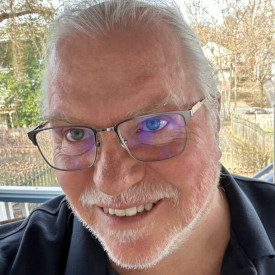
James Bruggers covers the U.S. Southeast as part of the Inside Climate News National Environment Reporting Network. (Credit: James Bruggers)
BRUGGERS: Well, I'm not sure exactly when we'll find out something new, but if their appeal is rejected, then the plaintiffs will have to make a decision on whether they want to attempt to take it to the Supreme Court or not. If the plaintiffs get what they're hoping for, the case will be sent back to the lower federal court for a trial and then the environmental justice advocates in St James Parish will have their day in court.
O'NEILL: Jim Bruggers is a reporter with our media partner Inside Climate News. James, thank you so much for taking the time with me today.
BRUGGERS: Thanks a lot, I appreciate it.
Links
Living on Earth wants to hear from you!
Living on Earth
62 Calef Highway, Suite 212
Lee, NH 03861
Telephone: 617-287-4121
E-mail: comments@loe.org
Newsletter [Click here]
Donate to Living on Earth!
Living on Earth is an independent media program and relies entirely on contributions from listeners and institutions supporting public service. Please donate now to preserve an independent environmental voice.
NewsletterLiving on Earth offers a weekly delivery of the show's rundown to your mailbox. Sign up for our newsletter today!
 Sailors For The Sea: Be the change you want to sea.
Sailors For The Sea: Be the change you want to sea.
 The Grantham Foundation for the Protection of the Environment: Committed to protecting and improving the health of the global environment.
The Grantham Foundation for the Protection of the Environment: Committed to protecting and improving the health of the global environment.
 Contribute to Living on Earth and receive, as our gift to you, an archival print of one of Mark Seth Lender's extraordinary wildlife photographs. Follow the link to see Mark's current collection of photographs.
Contribute to Living on Earth and receive, as our gift to you, an archival print of one of Mark Seth Lender's extraordinary wildlife photographs. Follow the link to see Mark's current collection of photographs.
 Buy a signed copy of Mark Seth Lender's book Smeagull the Seagull & support Living on Earth
Buy a signed copy of Mark Seth Lender's book Smeagull the Seagull & support Living on Earth

